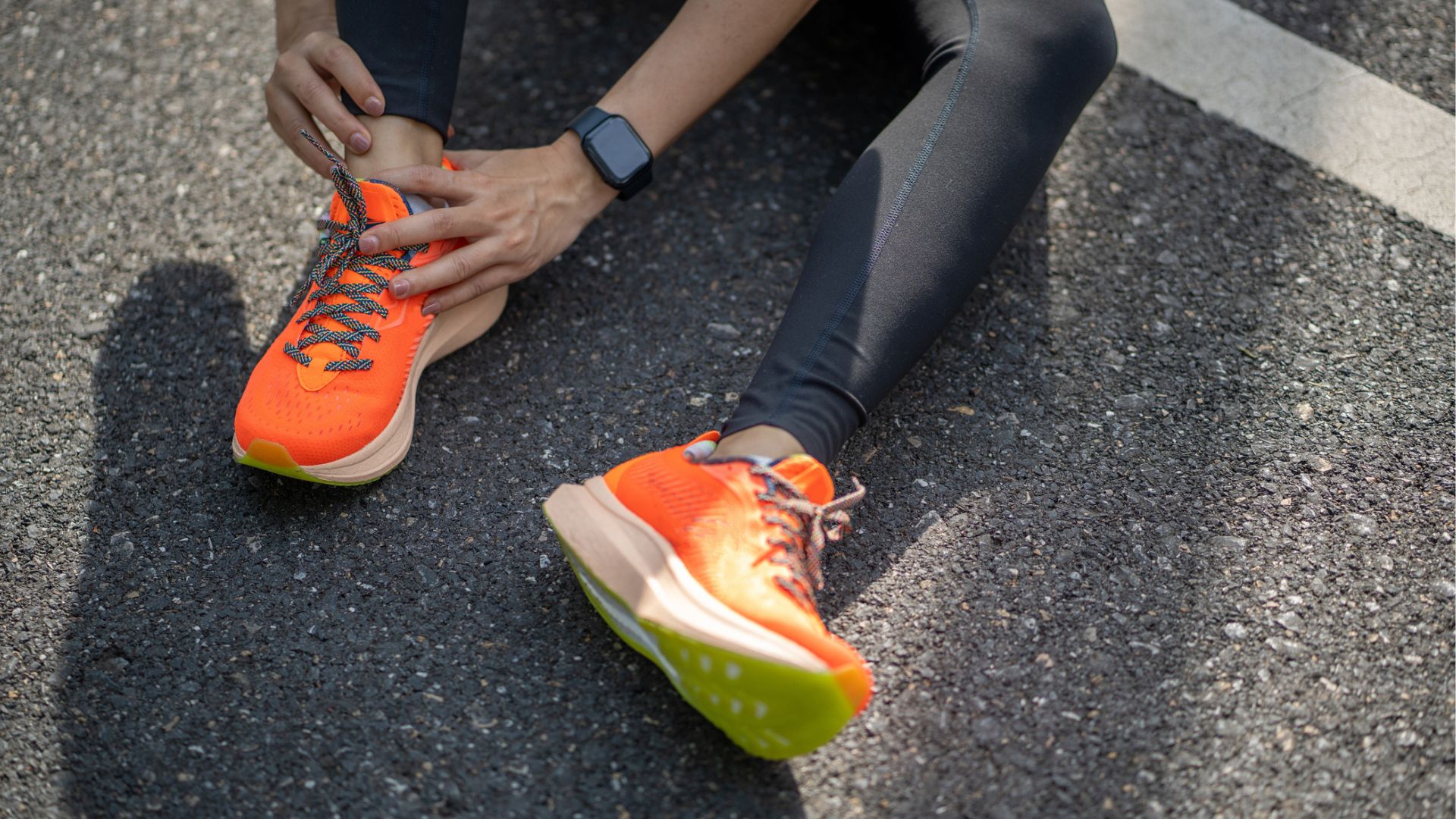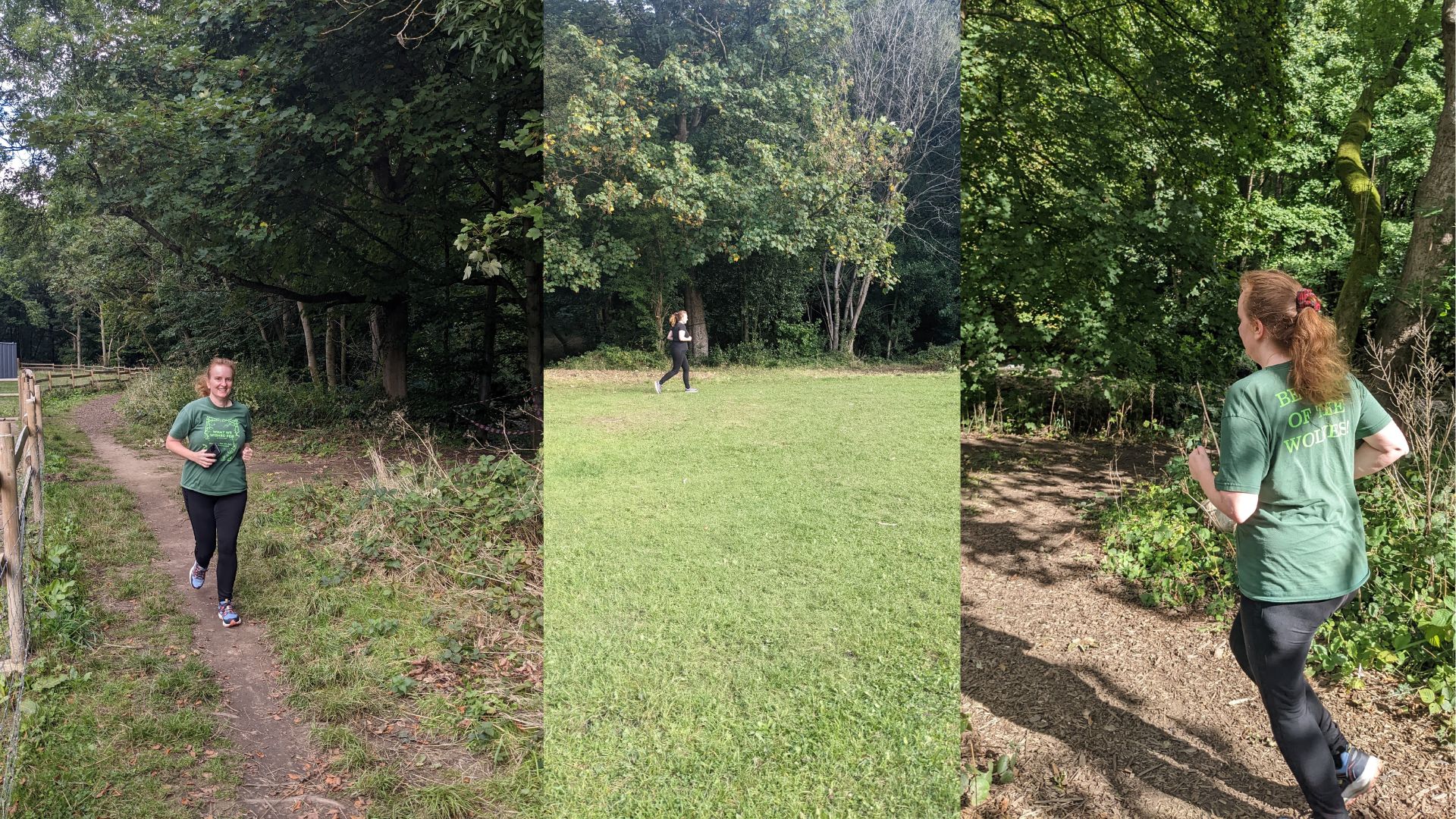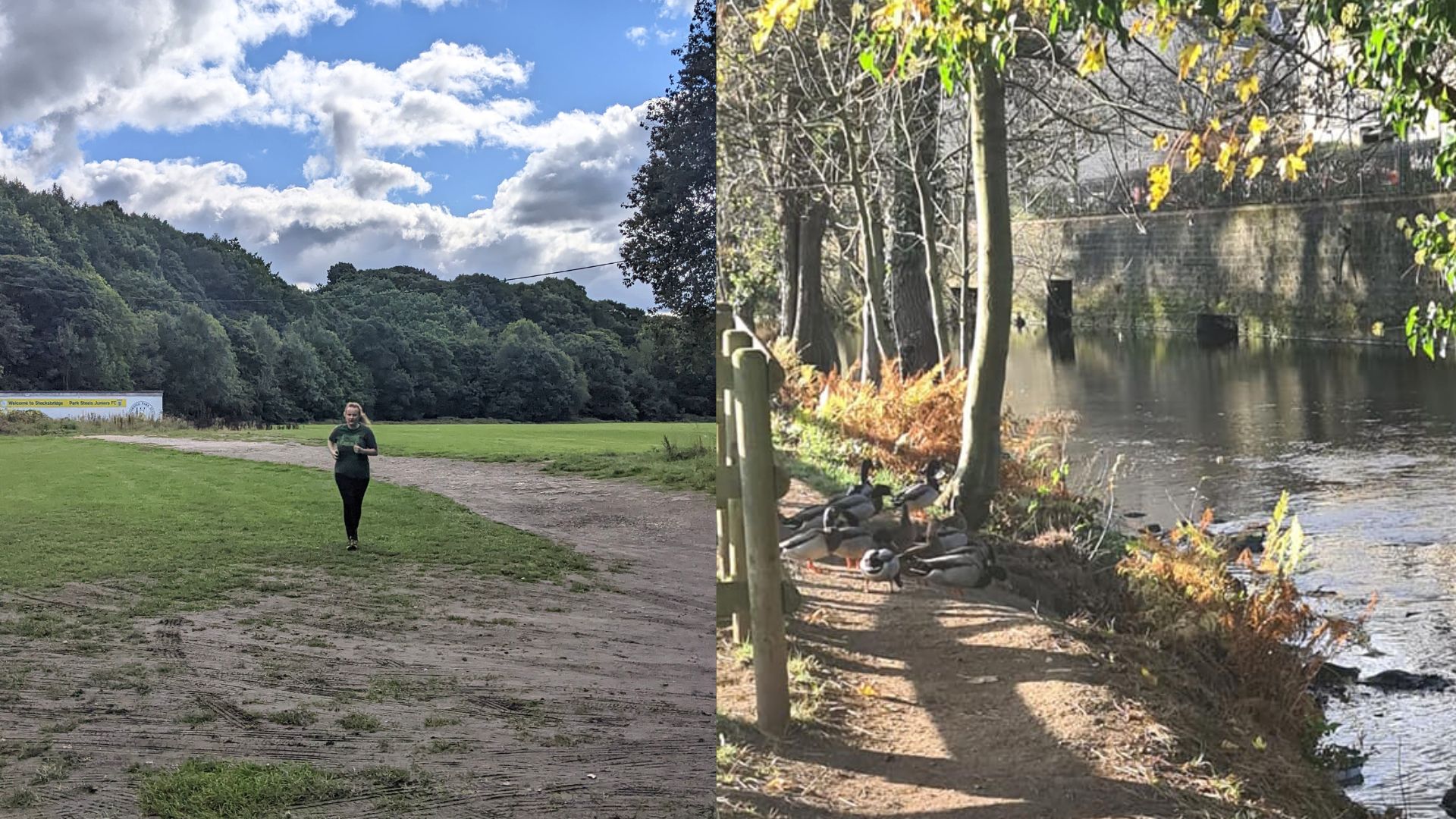I tried running for 30 minutes a day - these are the benefits I found after just two weeks
Writer Samantha Priestley started running 30 minutes a day to boost her physical and mental health. Here are all the changes she noticed in just 2 weeks


Running 30 minutes a day is a big commitment and it can be a real challenge if you're new to the activity, like I was. But now speaking from experience, it's an activity that comes with many benefits and once you've started, keeping it up isn't as hard as you might think.
Before I took up the challenge in my pick of the best running shoes, I assumed running for 30 minutes a day was reserved for 'serious' runners - not someone like me, who only runs occasionally and wouldn't call themselves a 'real runners'. I thought it was for people training for a marathon or the ultra-fit, so you can imagine my apprehension when I decided to try it for myself after running 20 minutes a day for a few weeks.
Although I've been prone to knee and ankle injuries in the past, I’m also currently dealing with the symptoms of menopause and running has actually helped me soothe my aching joints. It's also lifted my mood and pushed me to get outside in the fresh air, even when the weather hasn't been so good.
I’m aware of the importance of pushing myself a little more now that I’m getting older, and though I am running for weight loss too, it’s more about my muscular and cardiovascular health and mental wellbeing than anything else. "Regular running can improve bone density and decrease the risk of osteoporosis, which is very important for women in their 40s and over for the coming years," says Mike Hamlin NSCA, a CSCS personal trainer. Osteoporosis runs in my family, so this is especially important for me. With this in mind, I gave running 30 minutes every day a try and after running for two weeks, I couldn't quite believe the benefits I experienced.
Benefits of running 30 minutes a day
1. Running 30 minutes a day helps build fitness
The benefit of running 30 minutes a day on my fitness was one I was very early on in the challenge. I’m used to running for shorter periods and I’m used to walking for 30 minutes every other day or so, so I was interested to find out what the differences were between running vs walking. It was hard at first and there were days when I thought I wouldn’t make it through the full 30 minutes, but I stuck to an 80/20 running method and kept trying, switching between running and walking on many of the earlier days.
I didn't get significantly faster in the first fortnight of the challenge, but I did find that the runs became easier.
"In two weeks, you may notice quite the difference in your abilities," says Hamlin. "Even if you don't see a massive change in run times, you should start to feel more confident in your stride just by going through the action of running for a couple of weeks."
Sign up for the woman&home newsletter
Sign up to our free daily email for the latest royal and entertainment news, interesting opinion, expert advice on styling and beauty trends, and no-nonsense guides to the health and wellness questions you want answered.
2. It can help you sleep better
Menopause and insomnia tend to go hand in hand and it's certainly something I've experienced in recent years. To my surprise though, even after just a couple of days of running, I was ready for bed earlier than normal, found myself drifting off to sleep a lot easier, and I slept much more deeply without waking up during the night.
I woke up feeling refreshed and, as the week went on, I began to feel more ready for my daily run as my energy levels were up.
Sleep and running go hand-in-hand though, explains Lorna Wilkins, a level 4 personal trainer. "Resting and getting a good eight to nine hours of sleep will help improve your recovery time and give you a good boost of energy when you run," she says. So, as much as running 30 minutes a day can help you sleep, sleeping well can also help you run better.

Running outdoors gives me the chance to get some fresh air as well as some exercise.
3. Running can help with weight loss
Running (or cardio exercise in general, whether that's walking 30 minutes every day or cycling as a workout) combined with regular strength training is the best way to lose weight in menopause, several studies and experts have told me.
I put on a little weight when my menopause first hit and one goal I had with running 30 minutes a day was to start working back towards the size I was before.
While I only saw a small amount of weight loss in the two weeks, this did translate to my muscles looking more defined. Had I changed my diet at the same time, opting for a calorie deficit, I would have seen more results.
4. Running 30 minutes a day can reduce stress and anxiety
While it’s no substitute for seeking professional help if you suffer from anxiety or any other mental health issues, I found running to be one of the best exercises for stress relief, boosting my mood.
I've always found being able to get out in the fresh air and among nature helpful when it comes to dealing with stress and anxiety, something I’ve suffered more with since experiencing menopause. Yet, running for 30 minutes per day has supercharged this reduction even further, simply because I'm spending longer outside.
Hamlin suggests another reason for this running-related mood boost. "Running is cardiovascular work and this has a particularly positive mental effect on us," he says, all thanks to the prefrontal region of the brain, which is involved in mood regulation. As a study linked to the University of Tsukuba reveals, even 10 minutes of moderate-intensity running can bring about a more positive mood by activating this brain area."
“In addition, you will notice that your muscles don't feel as sore anymore since your body will have adapted to this huge training stimulus that it wasn't prepared for at one point, and that brings a feeling of achievement and tangible progress.”

What happens if you run 30 minutes a day?
If you run 30 minutes a day, as I did, chances are you'll notice a difference in both your mental and physical wellbeing. I feel stronger than I did before I started this challenge. One of my main aims was to improve the weakness and pain I’ve been having in my joints since menopause. My knees used to hurt just walking up and down stairs and my ankles would give me pain during shorter runs. After running for 30 minutes a day, I can honestly say these pains have almost completely gone.
As Hamlin says, this is a huge bonus for anyone experiencing menopause symptoms. "One of the main benefits women over 40 will get [from running regularly] is increased bone density, which is important," he notes, as the natural decline in hormones like oestrogen during menopause lowers bone density and puts those going through it at a higher risk of osteoporosis and fractures. But as the trainer also says, improving bone density can be beneficial women of any age.
However, I did feel tired after running every day for two weeks. While it was a great challenge to take my running to the next level, I'm not sure how sustainable it is long term.
Concerned about losing the progress I'd made over the two weeks, I asked Hamlin if I could still experience the same benefits of running after shorter sessions on some days, whether it's even necessary to run for 30 minutes a day or if a gentler exercise for a longer amount of time would be better.
“While running for 30 minutes a day can provide many health benefits, it may not be for everyone," notes Hamlin. "The American Heart Association recommends at least 150 minutes of moderate-intensity aerobic exercise per week, which can be broken into smaller sessions if needed. So, running for two to three times a week for 20 to 30 minutes can also contribute to positive health and wellbeing."
Overall, he notes, "More movement every day can be helpful for the average person. But for one person, running 30 minutes per day may be too much and it may not be enough for another. There is a lot of individual variation in this and it will depend on their injury history, weight, and cardiovascular health.”
If you only have one pair of running shoes and you're looking to run every day, it's worth buying another pair or at least understanding how to clean running trainers as they can take a hit with so much use.
Tips for building up your running endurance
- Accept that it's going to be a challenge: Even if you’re not already a regular runner, like I was, going from shorter runs or not running every day to running 30 minutes a day can be tough. It’s important to understand your mind and body as a whole and to pay attention to it.
- Diversify your training: It's a good idea to complement your running with alternative activities that can boost your endurance, such as strength training for women. This can also help to prevent common stress injuries and strengthen the smaller muscles around the larger muscles you use when running.
- Eat the right foods: Personal trainer Wilkins, who is also the founder of wellness and consulting company Tommy Hatto Online, points out that what you’re putting into your body is as important for endurance as how hard and frequently you train. “It’s essential to make sure that you're fuelling your body with the right food. [You should be] eating all food groups and sufficient amounts of carbohydrates, such as oats, to give you energy prior to running, and protein to help aid muscle repair and recovery afterward."
- Invest in good kit: If you're not comfortable when you're running, you're unlikely to stick to it. Make sure to get fitted for a good pair of running shoes and opt for the best running shorts for women.
- Change up your environment: Getting bored of your same old running route every day? Change things up - try doing a program of Couch to 5km on a treadmill for a few days instead of running outdoors, for example.
- Listen to your body: It’s also really important to know when you need to take a break. I like a challenge and I did push myself during these two weeks, but I know my limits and if something doesn’t feel right I’m not afraid to slow down. I also listened to the aches and pains I felt after each run, taking the time to stretch and cool down (with one of the best stretching apps for runners) post-workout.
- Take regular rest: “Listen to your body,” says Hamlin. “Pay attention to how you feel. If you are not feeling recovered mentally or physically there is a chance that you are overtraining and you may need to back off. This can help you in the long term by knowing how much running volume you can put your body through to improve your endurance and prevent injury."
Samantha is a freelance writer from Yorkshire, writing about health and wellbeing for Woman & Home, Reader's Digest, Giddy, and Good Housekeeping. For the past 15 years, she's combined her personal experiences with reporting, to write about menopause, fitness, sleep, and healthy eating. She also writes about travel and food and drink for The Independent, The Good food Guide, Lonely Planet, Frommer's, and more.
-
 Unforgettable date ideas to make a great first impression or rekindle romance
Unforgettable date ideas to make a great first impression or rekindle romanceForget the same old first date formula - these unforgettable date ideas will leave them thinking about you long after you go home
By Natalie Denton Published
-
 Butter yellow might be the colour of the season, but Amal Clooney is making me want to try sunshine shades
Butter yellow might be the colour of the season, but Amal Clooney is making me want to try sunshine shadesSpark some joy by adding some statement yellow pieces to your wardrobe just in time for summer
By Matilda Stanley Published